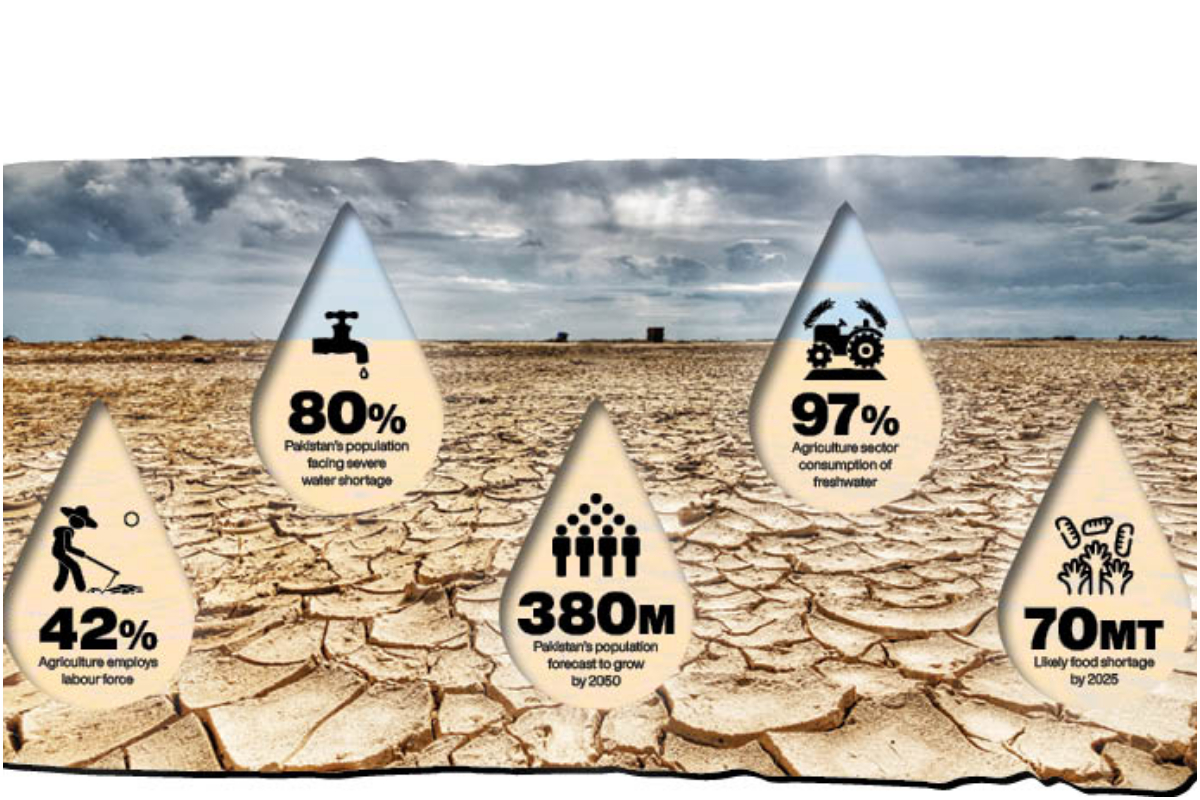
Save, Before It’s Too Late
With an expected revival of the International Monetary Fund’s (IMF) loan programme under the Extended Fund Facility, the fiscal situation of Pakistan is likely to stabilise, which will ultimately prompt friendly countries such as China, Saudi Arabia and the UAE to park some dollars, too.
However, several other problems will continue to haunt the country. Among them the most pressing issue is the acute water shortage. This crisis will not only affect the agriculture sector, which contributes 23 per cent to the GDP and employs 42 per cent of its labour force but also will take the form of an existential threat to energy and food security.
A report by the Pakistan Institute of Development Economics (PIDE), Water crisis in Pakistan: Manifestation, causes and the way forward”, highlighted the gravity of the issue.
According to it, Pakistan ranks 14 of the 17 “extremely high water risk” countries in the world, as the country wastes one-third of available water. Similarly, more than 80 per cent of the country’s population faces severe water scarcity, while water availability in Pakistan has plummeted from 5,229 cubic metres/inhabitant in 1962 to just 900 cubic metres in 2020.
According to PIDE, more than 80 per cent of Pakistanis face severe water scarcity for at least a month each year, while the country ranks 14 of the 17 countries designated as the extremely high water-risk nations.
The agriculture sector consumes 97 per cent of the freshwater and the water crisis is putting the largest sector of the economy at stake. Besides, water scarcity, there are several other issues such as waterlogging, and salinity, which are badly affecting various crops.
According to estimates, Pakistan is likely to face around 70 million tonnes of food shortage by 2025, meaning an existential threat to the country is in the offing. Similarly, water availability affects the crop productivity of cotton, sugar and wheat.
The lethargic behaviour of the successive governments towards growing water shortage at all levels and the lack of planning have resulted in a severe water crisis in the country.
Pakistan has reached a phase, where its water management system is progressing in the wrong direction and the situation is moving from bad to worse.
Meanwhile, a United Nations report has forecast Pakistan’s population to grow to 380 million by 2050, while the water demand will reach 274 million acres feet (MAF) by 2025.
The water sharing formula in Pakistan always remains a bone of contention between the two provinces, i.e., Sindh and Punjab and the Sindh government always complained about stealing of around 35 to 40 per cent of its water share, owing to which several crops, such as cotton, rice, mangoes, banana and other vegetables were badly damaged.
Water shortages always hit the minor crops also such as seasonal vegetables, maize, whole grain wheat and animal fodder. Water losses of 15 to 18 per cent due to various factors are common and understandable but it is surprising that Sindh always complained of getting less water share.
It appears the big farmers and feudal want this corrupt system to continue so that they can easily divert attention of the public from the water theft issue, which made the life of the small farmers miserable.
Pakistan is facing various challenges, especially food insecurity, owing to meagre allocation for research, shrinking agricultural land, disturbed weather pattern, water scarcity, slow pace of technology induction, the lack of crop diversification and value-addition, weak institutional support for the farmers and exports to a few markets.
It is ranked among the 10 most climate vulnerable countries in the world, with the implication for agriculture and food security. The key risks included water shortage, shift in weather patterns, flashfloods, heat stress and disease attacks that needed smart strategies for the agriculture sector. There is a need for research on biotechnologies to increase the yields and improve resistance in crops.
There is an immediate need to preserve whatever resources we have, starting with the Indus basin, considering that it acts as the heart of the entire country.
To achieve this objective, we need the expertise provided by the organisations such as the United Nations Environment Programme (UNEP), which will help in focusing on adaptation, mitigation and employing nature-based solutions to the environmental problems.
The government must ensure to allocate resources diligently so that we can see results soon. And when this project is successfully completed, we can also involve the UNEP in other initiatives that are bound to transform the way we approach development in the 21 Century.
Worldwide, around two billion people lacked access to safe drinking water in 2020; and an estimated 1.7 billion did not have even basic sanitation. Every year, more than 800,000 people die from diarrhea, because of unsafe drinking water and a lack of sanitation.
Most of those are in low- and lower-middle income countries. This is a mind-boggling and unacceptable situation. Even more so in an age when huge investments are being made in instant video calling, personalised medicine and talk of inhabiting other planets.
Pakistan needs to conserve water to save future generations from hunger and disease. The policymakers, media and even the public are least bothered with a threat to Pakistan’s national security, as was seen in television talk shows, where mostly politics has been the only problem. This mindset needs to be changed.
No doubt, political uncertainty is one of the major problems Pakistan is confronted with but there are other issues too, such as acute water scarcity in the near future.
It doesn’t require any rocket science to see that if the water crisis has not been addressed with a proactive approach, this can even lead to a conflict between the provinces, which can tear away the fabric of social cohesion, further weakening Pakistan from within.
It is time that the higher authorities realise the severity of the water issue and make efforts to overcome this problem before it is too late.
Catch all the Economic Pulse News, Breaking News Event and Latest News Updates on The BOL News
Download The BOL News App to get the Daily News Update & Live News.








 Read the complete story text.
Read the complete story text. Listen to audio of the story.
Listen to audio of the story.